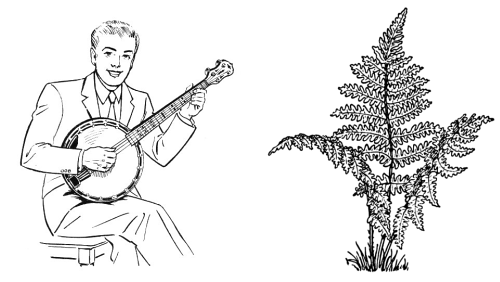
Advance each letter in BANJO four places through the alphabet and you get FERNS:
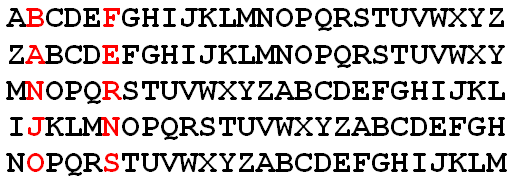
Advance MANFUL seven places and you get THUMBS. Surely this means something.

Advance each letter in BANJO four places through the alphabet and you get FERNS:

Advance MANFUL seven places and you get THUMBS. Surely this means something.
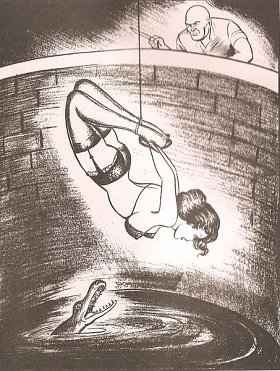
periclitate
v. to endanger
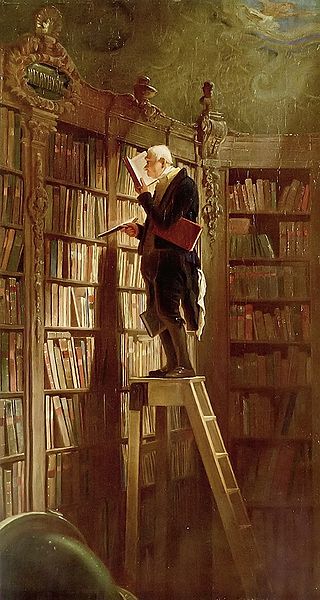
omnilegent
adj. having read everything
If God exists outside space and time, then how can he be omnipresent, present in all places at all times? If he exists within it, how could he have created it? How could a creation (or anything) take place outside time?
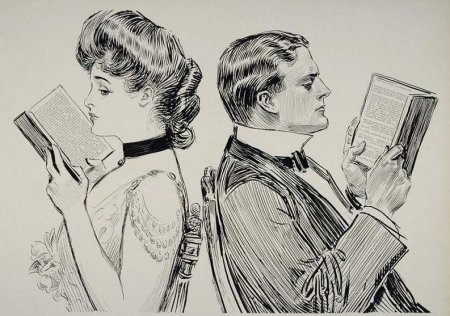
cagamosis
n. marital unhappiness
Fritz Zwicky referred to his colleagues at the Mount Wilson Observatory as “spherical bastards” because they were bastards whichever way one looked at them.
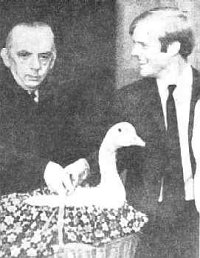
anserine
adj. of or resembling a goose
In 1936, Polish mathematician Stanislaw Mazur offered a live goose to the first person who could determine whether every Banach space has a Schauder basis. Thirty-seven years later, his Swedish colleague Per Enflo claimed the prize. The ceremony was broadcast throughout Poland. (Thanks, Jeremy.)
In the public gardens at Halifax, there is an eccentric goose that seems to manifest a genuine affection. Whenever a certain old gentleman, whose name we do not know, approaches the pond and calls ‘Bobby,’ the goose will leave the pond and sit beside him, and when he leaves to go home, will follow close at his feet, like a dog, to the gate, and sometimes into the street, when it has to be forcibly put back, to its manifest disgust, for it goes off to its native element twisting its tail with indignation, and giving vent to sundry discordant squeaks. The old gentleman says he has never fed it, or petted it in any way, which makes it more remarkable; but we are told by a frequenter of the gardens that about two or three years ago a man used to come there and feed this identical goose regularly, so we are inclined to think that it is a case of mistaken identity on the part of his gooseship. Anyway, it is an interesting question for ornithologists to solve, whether geese (supposed to be the most stupid of birds) have memory and can experience the sensation of gratitude.
— James Baird McClure, ed., Entertaining Anecdotes From Every Available Source, 1879
The longest unhyphenated place name in the United States is Kleinfeltersville, Pennsylvania.
That’s in real life, anyway. In the 2002 film Mr. Deeds, Winona Ryder’s character claims to come from Winchestertonfieldville, Iowa.
Complaint received by a French typewriter shop, reprinted in a local newspaper on the Île de Ré:
Monsixur,
Il y a quxlquxs sxmainxs jx mx suis offxrt unx dx vos machinxs à écrirx. Au début j’xn fus assxz contxnt. Mais pas pour longtxmps. Xn xffxt, vous voyxz vous-mêmx lx défaut. Chaqux fois qux jx vxux tapxr un x, c’xst un x qux j’obtixns. Cxla mx rxnd xnragé. Car quand jx vxux un x, c’xst un x qu’il mx faut xt non un x. Cxla rxndrait n’importx qui furixux. Commxnt fairx pour obtxnir un x chaqux fois qux jx desirx un x? Un x xst un x, xt non un x. Saisissxz-vous cx qux jx vxux dirx?
Jx voudrais savoir si vous êtxs xn mxsurx dx mx livrxr unx machinx à écrirx donnant un x chaqux fois qux j’ai bxsoin d’un x. Parcx qux si vous mx donnxz unx machinx donnant un x lorsqu’on tapx un x, vous pourrxz ravoir cx damné instrumxnt. Un x xst très bixn tant qux x, mais, oh xnfxr!
Sincèrxmxnt à vous, un dx vos clixnts rxndu xnragé.
Xugènx X—-
From John Julius Norwich, Christmas Crackers, 1981.
If a reincarnated person has no memory of her past life, then in what sense is she the same person?